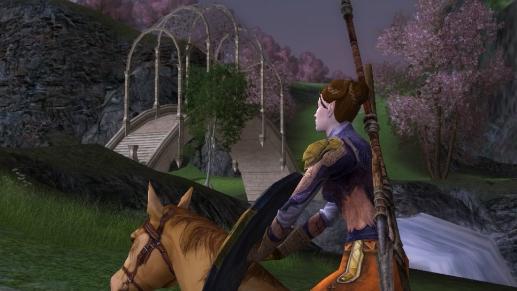the-soapbox
Latest

EVE Evolved: The end of EVE Evolved
By now, you will have heard that Massively is being shut down along with Joystiq and countless other blogs run by AOL. That unfortunately means this will be my final article for Massively and marks an end to the nearly seven-year run of the EVE Evolved column, which now holds over 350 articles on topics ranging from ship fittings and opinion pieces to guides and expansion breakdowns. I'd like to take this opportunity to thank all of you for your readership and to express just how much playing EVE Online and writing for you really have impacted my life. I've been asked by so many people over the years for tips on breaking into the games industry as a journalist or MMO blogger, but the truth is that I lucked into this gig. When a post on the EVE Online news page said that some site called Massively was hiring an EVE Online columnist, I almost didn't bother applying. I was a prolific forumgoer back then and had written some guides for EON Magazine and my own blog, but I wanted to get into game development and had very little confidence in my writing ability. What I didn't know then was that writing for Massively would help improve my writing skills immeasurably and even help give me the confidence to launch my own game development studio. Massively gave me a platform on which to talk about EVE Online and an eager audience to share my game experiences with, but it turned into something much more profound. There have been low points dealing with trolls and organised harassment and tough times with budget cuts, but there have also some incredible experiences like attending the EVE Online Fanfest, investigating monoclegate, watching CCP redeem itself in the eyes of players, and collaborating with some of the best writers in the games industry. In this final edition of EVE Evolved, I look back at the start of the EVE Evolved column, break down my top ten column articles of all time, and try to put into words how much this column has meant to me over the years.

The Soapbox: Of course I care what you're doing in MMOs
I mulled being positive about the MMO industry as a new year's resolution. Then I remembered that new year's resolutions are silly because if it takes an arbitrary date and a contrived occasion to do something, that something is probably not worth doing! With that in mind, let's kick off the 2015 Soapbox season with a mini-rant about one of the nuttier MMO-related misconceptions of all time. I ran across this gem on a forum very recently, and while it's not a new notion, it's a dumb notion and therefore it's worth blowing up. What's the notion? Here, let me just quote the poster. "Why do you care what other players do in an MMORPG? It doesn't affect you."

Under construction: Who benefits from MMO early access?
On its Early Access page, Steam posts a manifesto of sorts praising this radical new type of development in which players get in on the alpha or pre-alpha stage, saying, "This is the way that games should be made." Is it? I'm not so sure. Early access -- and all of the other similar names for the same concept -- appears to be the latest trend that's sweeping not just MMOs but video games in general. Both Steam and crowdfunding sites like Kickstarter are largely responsible for promoting early access, and it has been a popular attraction for players who previously had to sit on their hands and wait for a game to get, y'know, finished. Now we can indulge instantly and run around the structure even as it's still under construction. I was talking about early access with Bree on the podcast the other day, and both of us were expressing distaste and an increasing uneasiness with the early access trend. Popular as it may be, is it really the way that games should be made? Will it result in better titles in the end? And who is getting what, exactly, out of it? It's this last question I want to address today.

The Soapbox: Better models for MMO endgame progression, part three
Today marks the last entry in my better models for MMO endgame progression series, the follow-up to my series on why MMO studios should abandon raiding. And that means providing two more possible models along with something of a thesis statement. But it also means that at this point I'm far more willing to wander off into the woods with these ideas. The first part had slight twists on standard formulas, the second had ideas that was a bit further afield, and this one features two ideas that are still almost entirely unrefined. More specifically, today's concepts are more about tackling the very principle that progress has to be tied past a certain point to things that you get. You earn a thing and then you're better. But there's no reason that progress can't be oriented the other way, with the gear (etc.) just being a gating mechanism for your actual forward motion. The funny part is that a lot of these systems aren't really at odds with one another; they can coexist without too much trouble. But then, that's the nature of the beast.

The Soapbox: Better models for MMO endgame progression, part two
If you read yesterday's Soapbox, the first in my Better models for MMO endgame progression series, with a fair bit of awareness, you probably noticed that the models I presented were, well... safe. Normal. Not too far outside of the realm of what we already have in some games, in other words. Oh, sure, they were functional and expanded compared to what you normally see in games, and they weren't reliant on high-end raiding, but they were still derived from the same space, which is part of the point. But that's not nearly as far as the rabbit hole goes. So let's start moving further beyond what's already common. Let's start heading into stranger territory. As before, the models presented here are not super-refined balanced labyrinths of systems; they're the outline, the skeletons, the fundamentals of how these concepts could work. And even at this stage, they're able to go in directions you don't find in numerous MMO endgames. So let's jump right into it, shall we?

The Soapbox: Better models for MMO endgame progression, part one
Last month, my three-part Soapbox series on reasons studios should abandon raiding as the core mechanic of their MMOs produced no shortage of comments. One of the persistent refrains from the pro-raid side was, as expected, "if you're so smart, why aren't you proposing alternatives?!" The obvious answer would be that it wasn't the point of the articles. The series was about reasons to drop raiding, after all. But it's also not as simple as "here's what games should be doing" because there are countless alternatives. Tons of alternatives. I can think of at least six off the top of my head. So for this new series, let's consider models that don't rely upon raiding as an endgame progression model. Some of these are close cousins to endgame models found in games currently on the market, some of them are not, and none of them has been designed with fine details or lore or what-not in mind. They're drag-and-drop, as it were. The point here is explaining the multitude of options available for an MMO's endgame that don't rely upon raiding for their focus. Today's article will cover the first two of six I have in mind.

The Soapbox: Six reasons MMOs should abandon raiding, part 3
In parts one and two of this Soapbox miniseries, I tackled four of the reasons the MMO genre should abandon raiding as a central gameplay element, but one key argument has been left out until now: The social aspect of raiding. Whatever else is true of raiding, it is definitely social. Communities spring up and keep going largely based on that raiding community, to the point that it's easy to assume that everyone in a game's population raids. There are lengthy discussions about raiding, about how to raid, about tips and tricks for clearing raids. The social aspect of raids is what I think has kept them around so long; it's easy for a designer to look at that sort of engagement and see it as vital. Yet there's more to the story than might be available at a glance, and the social aspect is not without steep costs. Those social elements do not carry the weight of everything else... mostly because they aren't as strong as they appear.

The Soapbox: Six reasons MMOs should abandon raiding, part 2
In yesterday's Soapbox, I had some things to say about why it's time to dump raiding. I'm writing this before I've seen the comment responses, but I'm willing to bet that a fair amount of angry shouting was involved in the comments because that's what I usually expect. But I wasn't done, as suggested by the whole "part 1" thing in the title header. For those don't feel like reading the whole thing, the short version is that raiding is too expensive to develop for too small a portion of the players. This is a solid argument, but it's standard: You hear it every time this debate comes up. In some ways, it's the foundation of the argument against raiding beyond the reality that most people say they just don't like raiding. There's more to be said, though, and there are more serious issues up for discussion. Raiding isn't just expensive in terms of development. It's expensive in lots of ways.

The Soapbox: Six reasons MMOs should abandon raiding, part 1
Raiding is no longer doing MMOs any favors. I've compared raiding to open PvP in the past, and the comparison still holds up. It's something that a lot of games developed in response to a specific genre-defining game have featured. But it's not doing those games any favors, and it might be time to take a hard look at this gameplay element that games survive in spite of rather than because of. If we learn nothing else from WildStar's issues when it launched into what should have been an ideal environment, it's that raiding certainly isn't driving players into a game's waiting arms. But I don't want to just say that and let it roll around on the floor. Let's actually break the argument down across a couple of articles this week. Why does raiding need to shuffle off of the main stage, definitely as the default endgame model, perhaps altogether? I can give you six good reasons.

The Soapbox: In praise of SWTOR's 12X experience
It's taken 12 times the normal XP rate, but Star Wars: The Old Republic is finally my main MMO (at least for another week or so). Well, OK, it's also taken a series of spectacularly ill-considered decisions by XLGAMES and Trion, but that's a rant for another day. I've been playing SWTOR quite a lot over the past month since BioWare's subscriber-only pre-expansion boost has cut all of the godawful grindpark garbage right out of a galaxy far, far away. Too bad it's just a temporary fix, though -- here's hoping that the devs give veterans the option of keeping the XP bonus long after December 1st.

The Soapbox: This is how reviews actually work
Welcome back to the Soapbox, folks. Actually, let's call this a mini-Soapbox, since it's just a wee thing compared to some of the walls-of-text we've previously published in this space. Anyhow, let's talk about reviews, bias, and subjectivity. Whether it be film criticism, concert recaps, book reviews, or game reviews, there's an illogical expectation out there regarding "unbiased" work and -- to directly quote a recent Massively commenter -- "correct and honest" reviews.

The Soapbox: Let me tell you how little I want to raid
Over the past several years, Blizzard has been very attentive when it comes to making it easier for players to raid. Raid sizes have gone down, then they've moved over to a flex structure. The raid finder was added to the game. Mechanics were toned down, while getting drops has been made even easier. With the next expansion, you won't even need to toy around in difficult instances to get ready for raiding; you can just jump in pretty much from the point you hit the level cap. All of this in response to a lot of people saying that they don't want to raid -- all of this so thoroughly missing the point of that statement. This is one of those hurdles a lot of designers can't seem to conceptually get over. World of Warcraft's design team has had years of people saying this, and every response from the team has been missing the point so completely that it's almost absurd. I don't want to raid, at all, ever. End of discussion.

The Soapbox: Does Trion realize what it has in ArcheAge?
Can I share how nervous I am about the fact that ArcheAge is finally heading West? Thanks because I really need someone to talk to about this stuff. I'm going to skip over the F2P hand-wringing, both because I covered it nine months ago and because there's nothing anyone can do about it. And there's plenty of reason to fret about the rest of what's in store for starving western sandbox fans, anyway. Join me after the cut and we'll worry about it together.

The Soapbox: My hypersexualization conundrum
Every now and then here at Massively, we receive an email that isn't super nice. I know this may come as a shock to many of you -- the internet is, after all, a place of tolerance and constructive debate -- but sometimes the Massively inbox is no place any sane person would want to be. One reader recently took the opportunity to offer some choice thoughts on Massively staffers. And amidst the jumble of insults and generalizations, the reader levied the ever-powerful "hypocrisy" charge at us for claiming to care about hypersexualized designs of female characters in MMOs while simultaneously playing as those very hypersexualized characters. How could we possibly purport to care about the presentation of women in games if we're all running around in chainmail bikinis? Generally speaking, I prefer to not have my habits and behavior challenged via ad hominem attacks and false comparisons. But I have to admit that this one particular charge piqued my curiosity. Why is it that the majority of my characters are female? Am I, as a person who looks down on hypersexualized designs in games, committing an act of hypocrisy every time I create a female character? Let's sort it out. And before we begin, remember that the Soapbox, like most of our editorials, is just one person's opinion and doesn't represent the thoughts of Massively as a whole.

The Soapbox: Old content should stay relevant
The archetypal themepark MMO model, as popularised by World of Warcraft, is a race to the level cap in order to unlock the best content on offer. New content is tacked onto the endgame regularly, accompanied by improved gear and perhaps a higher level cap. It's a system that's designed to keep people playing by keeping them on a progression climb that's constantly getting steeper. As a consequence, endgame activities render older content obsolete since these outdated activities carry little real benefit for fully leveled characters. Exploring old content for the sake of experiencing it is not enough of a motivator for many players since this content simply cannot present the same challenge as it once did. Although you can technically go back and play through old dungeons, they will never be as fulfilling when tactics become optional and you can solo once-formidable opponents. In this week's Soapbox, I will mourn the loss of fantastic older content that was rendered obsolete through vertical progression, using WoW as a key example. I'll go on to suggest a solution that I think might allow for both old and new content to exist together in relevancy without significantly compromising the themepark MMO's existing progression mechanics.

The Soapbox: Novel content trumps novel mechanics
Action combat. Interactive conversations. Public quests. Voxel worlds. There are many game mechanics that developers of massively multiplayer online games crow about when promoting their games because these are the things that make their games stand out from the pack. Even if they're not the first to do it, they'll proclaim that they're doing it bigger and better than their predecessors. I don't have a problem with any of this. It's when the developers and their ardent fans gloss over the importance of the actual content these mechanics are applied to that I get annoyed. Mechanics are just a skeleton, and they can't do anything at all without some meat on the bones. Content matters, and good, fresh content will keep players interested long after the novelty of unusual mechanics has worn off.

The Soapbox: MMO 'nostalgia' isn't nostalgia
Here's the Merriam-Webster online dictionary definition of the word nostalgia. nos·tal·gia noun \nä-ˈstal-jə, nə- also nȯ-, nō-; nə-ˈstäl-\ : pleasure and sadness that is caused by remembering something from the past and wishing that you could experience it again 1 : the state of being homesick : homesickness 2 : a wistful or excessively sentimental yearning for return to or of some past period or irrecoverable condition; also : something that evokes nostalgia And here's where I tell you that nostalgia is the most misused, overused, and overly simplistic word in modern MMO discourse.

The Soapbox: The Raid Finder ruined raiding
I don't typically limit myself to ranting about only one game at a time, but I decided to make an exception this week and speak out against World of Warcraft's Raid Finder mechanic. I was running a small and modestly successful raiding guild when this system was introduced, and my team definitely felt the onslaught of this guild-destroying game mechanic first hand. Raid Finder, commonly dubbed LFR by the cool kids in Orgrimmar, is a system that demolishes the competency barrier that stands in the way of freshly level-capped characters and normal raiding content. The system allows players to join a random raiding group in order to tackle a nerfed version of a normal raid and exists mainly to maximise inclusion in the game's best PvE endgame content. LFR was quite popular among casual players that were usually passed up when it came to raiding group formation, but it didn't offer much progress to seasoned raiders. The gear gained had lower stats than its corresponding normal raid counterpart, but the LFR tier simply didn't need the co-ordination required of a group tackling regular raids. A void was created somewhere in between the casual masses who could benefit from the LFR mechanic and the hardcore raiders that simply did not need help with progression. My casual raiding guild was caught in the middle and ultimately met its demise at the hands of LFR, which simultaneously depleted the PUG pool and gave our members another way to see the endgame content they wanted without putting in virtual blood, sweat, and tears.

The Soapbox: Enough with selling alpha tests already!
The dam has burst, restraint has been cast off, and caution has been thrown to the wind. Seemingly overnight, game studios all over the place have thrown the doors open to the general public to get in on alpha testing, usually as a reward for loyalty and financing. Steam has an entire Early Access section that's dominating the sales charts, offering players a chance to hop right into an anticipated game while it's still in the middle of development. Kickstarter games routinely offer alpha and beta access to their financers as part of their reward structure. Trove, Elite: Dangerous, Shroud of the Avatar, Star Citizen, and EverQuest Next Landmark are among the vanguard of upcoming MMOs that have promised alpha or early access to players willing to shell out a few bucks right now. It's not enough to covet and chase after a beta key these days; all of the cool kids are in the alpha, apparently. The willingness of developers to wield alpha access as a reward and the enthusiastic acceptance by gamers to literally buy into it has me very concerned that this could poison the industry, the community, and the future of our games.

The Soapbox: Launching with a subscription is still a good idea
The massively multiplayer online game industry is constantly changing, but one thing about it never will so long as capitalism stands: MMOs have ongoing costs, and those costs are passed on to the end user. Exactly how they're passed on is one of the things that has been changing, but new methods don't mean old methods don't have their place. New isn't good because it's new. New is good because it can provide solutions to old problems. When an old method is seen as the source of a problem actually caused by something unrelated, shoving a new method in there can just create new problems. So why all the wailing and gnashing of teeth over games trying out a subscription before they move onto other models? And why all the wailing and gnashing of teeth in retaliation to this opinion?






